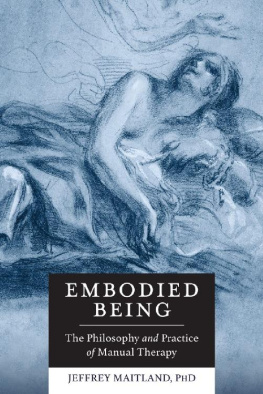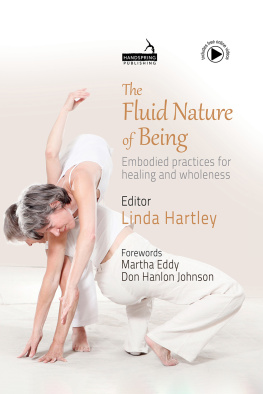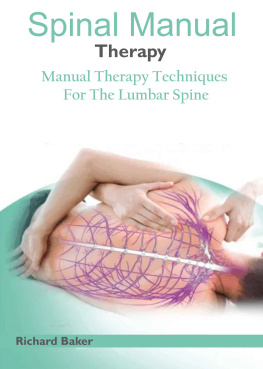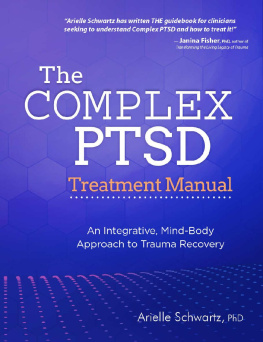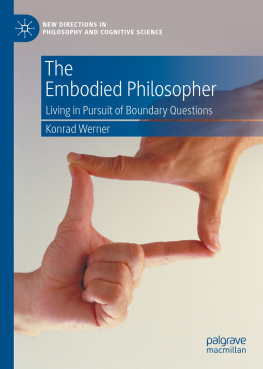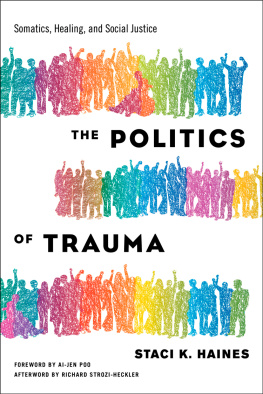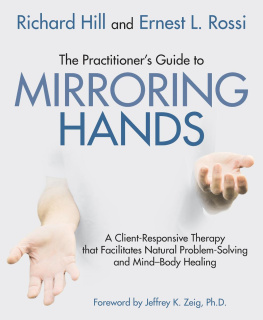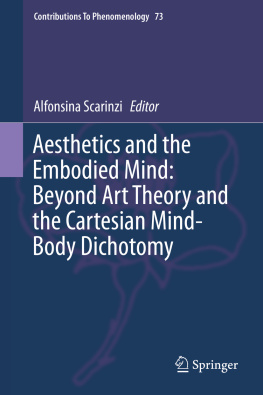EMBODIED BEING
The Philosophical Roots of Manual Therapy
JEFFREY MAITLAND, P H D

North Atlantic Books
Berkeley, California
Copyright 2016 by Jeffrey Maitland. All rights reserved. No portion of this book, except for brief review, may be reproduced, stored in a retrieval system, or transmitted in any form or by any meanselectronic, mechanical, photocopying, recording, or otherwisewithout the written permission of the publisher. For information contact North Atlantic Books.
Published by
North Atlantic Books
Berkeley, California
Cover art by Volterrano (Baldassare Francheschini), Truth Illuminating Human Blindness, about 1650. Digital image courtesy of the Gettys Open Content Program.
Cover design by Jasmine Hromjak
Embodied Being: The Philosophical Roots of Manual Therapy is sponsored and published by the Society for the Study of Native Arts and Sciences (dba North Atlantic Books), an educational nonprofit based in Berkeley, California, that collaborates with partners to develop cross-cultural perspectives, nurture holistic views of art, science, the humanities, and healing, and seed personal and global transformation by publishing work on the relationship of body, spirit, and nature.
North Atlantic Books publications are available through most bookstores. For further information, visit our website at www.northatlanticbooks.com or call 800-733-3000.
MEDICAL DISCLAIMER: The following information is intended for general information purposes only. Individuals should always see their health care provider before administering any suggestions made in this book. Any application of the material set forth in the following pages is at the readers discretion and is his or her sole responsibility.
Library of Congress Cataloging-in-Publication Data
Names: Maitland, Jeffrey, 1943
Title: Embodied being : the philosophical roots of manual therapy / Jeffrey Maitland, PhD.
Description: Berkeley, California : North Atlantic Books, [2015] | Includes .
Identifiers: LCCN 2015035427 | ISBN 9781623170264 (paperback) ISBN 9781623170271 (ebook)
Subjects: LCSH: Manipulation (Therapeutics) | BISAC: HEALTH & FITNESS / Massage & Reflexotherapy. | HEALTH & FITNESS / Alternative Therapies.
Classification: LCC RM724 .M32 2016 | DDC 615.8/2dc23
LC record available at http://lccn.loc.gov/2015035427
for Lee-Ann
CONTENTS
Surprised I Still Had Toes
My professional education as a psychiatrist taught me observation, knowledge, and thinking. Our patients had bodies, of course. Yet it was their minds we focused on. Personal experience plus over three decades of psychiatric practice taught me just how vital embodiment is to all aspects of health. I know we must pay attention to bodies, at least as much as to minds.
Embodied Being is about coming home to our bodies and to our authentic selves. From here, we become free to love and live and flourish at our best. On the other hand, a chronic lack of being fully embodied appears to be a source of chronic and sometimes severe suffering. I have found that this suffering is rarely relieved by the minds thoughts or by talking therapy alone. Holistic somatic/manual therapists can be essential to the homecoming process.
I know personally the importance of being at home in my body. I began to learn this thirty years ago when my daughters died. Almost immediately, I became numb. I no longer could feel my body or my emotions. I looked down and was surprised I still had toes. I clearly still had a body but could not feel it.
It has been a long journey back to being embodied. In trauma, our bodies are wired to help us survive by moving painful memory and emotion out of our awareness. We do not intend for it to happen. It just does. It is part of the built-in way we protect ourselves. Disconnecting from feelings and pain in this way was life-saving for me, at the time. Eventually, I felt a strong urge to reconnect, come home to my body. Finding my way back meant, among other things, retrieving those feelings and memories that were out of awareness. I learned these were stored not in my mind (or what some might call the subconscious) but deep in my body, in the soma.
Dr. Maitland argues that there is no such thing as the subconscious. I agree! So did neuroscientist Candace Pert, PhD, who said, The body is the minds subconscious. When our minds or nervous systems become overwhelmed and unable to process what is happening, it is the body with its observable energy field that astonishingly holds for us those important feelings and memories for safekeeping until it is time to release and harvest them for their healing potential.
The bodys brilliance appears in how it defends against releasing these at an unsafe time or in ineffective order. I have had the experience of working with therapists who were skilled therapists, good people. My body opened to their intention and skill, but then it quickly closed down even harder because it was not the right timing or order of release for my particular issues. It was crucial to find somatic therapists who can see holistically in ways that helped me release, in a safe way, what was stored.
This books brilliance is found in something rare in books on manual therapy: a richly tempered philosophical approach coupled with new and practical methods for learning to see holistically through all the senses, including a sixth sense. The book elegantly lays out a newly created three-step self teaching process in how to see holistically. The book also states the principles of intervention, perhaps for the first time for some manual therapists, and shows how to use them to good effect. The complicated process of designing treatment strategies is boiled down to answering three simple questions: What do I do first, what do I do next, and when am I finished?
As a trained philosopher, Rolfing instructor, and Zen monk, Dr. Maitland travels far in this bookfrom the breadth and depth of philosophys elegant language and arguments to down-to-earth plain-speak that often surprised me with words that quickly turned complexity into what is simple and relevant.
One such phrase I particularly like is order-thwarters. Basically, when all is well, bodies and minds have an innate rhythm, smooth flow and natural order. When flow is interrupted, the natural order is thwarted. Order-thwarters can have many faces. They may be myofascial restrictions, distortions, and complicated strain patterns throughout the body from birth trauma, trauma at any age, falls and accidents, illness, low back pain, exhaustion, joint fixations, fear, pain, faulty worldview, war, addictions, threats and dangers from outside, untimely deaths and losses, natural disasters and much more. Order-thwarters can be sensed by sensitive, holistic, somatic therapists who know how to see and properly apply and dose his or her remedies. Dr. Maitlands sections on how to identify and approach order-thwarters are to be savored.
In this book, Dr. Maitland often discusses philosopher Ren Descartes. I see Descartes as someone for whom natural order appears to have been thwarted from the start of his life. From birth, his mother was unavailable to him due to her illness and subsequent death by the time he was a year old. With nurturance, infants gradually learn to embody, touch their toes, smile at others and view the world. Sadly, Descartes did not have this in his early life. He apparently did not experience embodied being.
In my opinion, Descartess lack of being at home in his own body seems part and parcel to his often quoted line, I think, therefore I am. Without the nurturance adequate to become embodied, being in his head to think was all there was. I think, therefore I am seems to me to be very sad. I hear it as a statement of existence, but not of heart or authenticity or truly vibrant am-ness. Yet, his words have become so ingrained in our language and belief system as to almost antidote the reality of body and its importance.

